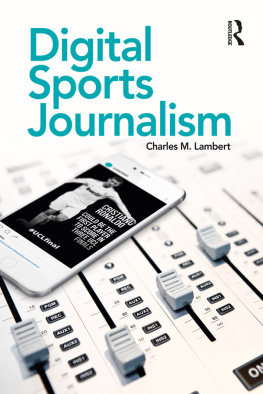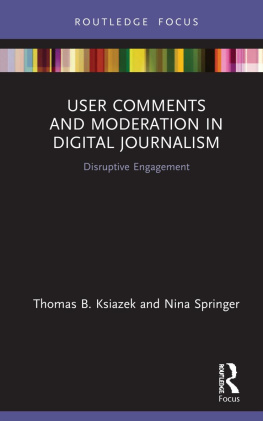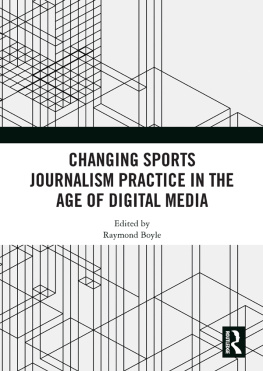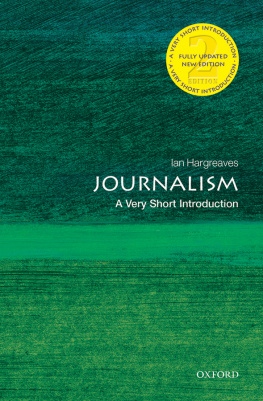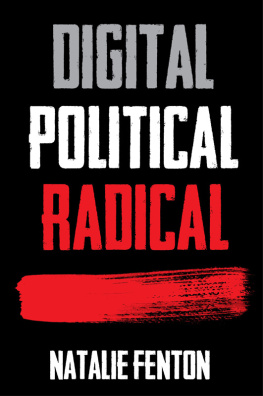First published in the UK in 2020 by Intellect, The Mill, Parnall Road, Fishponds, Bristol, BS16 3JG, UK
First published in the USA in 2020 by Intellect, The University of Chicago Press, 1427 E. 60th Street, Chicago, IL 60637, USA
Copyright 2020 Intellect Ltd
All rights reserved. No part of this publication may be reproduced, stored in a retrieval system, or transmitted, in any form or by any means, electronic, mechanical, photocopying, recording, or otherwise, without written permission.
A catalogue record for this book is available from the British Library.
Copy editor: MPS Technologies
Cover designer: Aleksandra Szumlas
Production manager: Laura Christopher
Typesetting: Contentra Technologies
Print ISBN 978-1-78938-168-9
ePDF ISBN 978-1-78938-169-6
ePUB ISBN 978-1-78938-170-2
Printed and bound by TJ International.
To find out about all our publications, please visit www.intellectbooks.com.
There, you can subscribe to our e-newsletter, browse or download our current catalogue, and buy any titles that are in print.
Nael Jebril, Stephen Jukes, Sofia Iordanidou and Emmanouil Takas
In 1932, the English author Aldous Huxley wrote a dystopian novel, Brave New World in which the digitization of every aspect of human anatomy and behaviour had constructed genetically modified citizens, new models of hierarchy and processes of psychological manipulation. The changes brought by digital media to our societies today are far from a mirror reflection of Huxleys technophobic vision or similar speculations shared by philosophers in the early twentieth century. But they undoubtedly have transformed the way individuals communicate, share meaning, create content, and consume publicly available information. By doing so, digital technology has not only led to alternative forms of media practice and representation, but has also disrupted the core relationship between politics, journalism and society.
The importance of the digital era, from todays point of view, is that three traditionally differentiated and distinct entities have come closer and that their relationship is constantly evolving through new communicative practices. The three entities of journalism, society and politics used to communicate through mainstream, traditional ways (e.g. newspapers, press releases and the voting station). But nowadays they exchange content constantly and extremely quickly. Social media, online platforms and blogs have caused a major shift in the speed and quality of the journalistic message, since journalists are expected to provide content at what can only be described as an exhausting pace. Additionally, politicians use extensively un-mediated forms of communication (i.e. social media) to communicate directly with their voters, even though they still cultivate close relations with major corporate media organizations. On top of that, citizens can express themselves instantaneously online, effortlessly create groups and collective entities, apply pressure on political issues and demand immediate action.
Against this background, shifts in political and power structures at the global and regional levels continue to emerge and draw public attention. In this challenging context, major theoretical and practical questions arise: what is the future (and essence) of journalism? How can citizens be properly informed in an environment that is flooded with diverse and unverified content? How can journalism education be re-imagined to overcome limitations of time and resource in todays digital news environment? How do social media mediate modern political campaigns and politicians relationships with voters? How do individual voices across social media become transformed into collective social movements? How can digital media cover and respond to changes in the global sociopolitical landscape that have resulted in successive waves of voluntary and forced migration? And finally, in which forms are the entities of journalism, society and politics interconnected and what are the implications of this new constellation for societies around the world?
In this volume, fifteen international experts with interdisciplinary academic and professional backgrounds offer a timely and unique discussion around these questions. They present theoretical models, case studies and methodologies essential to the analysis of the impact of todays digital media era on our societies and communicative practices.
The book is organized in four parts that touch on four related themes. Part I evaluates the transformative power of media literacy in the digital age and the challenges that journalism pedagogy encounters in global and fragmented environments. Part II critically examines the methods in which social media is used by politicians and activists to communicate during political campaigns and social protests. Part III discusses the impact of digitalization on professional journalism and news consumption strategies. Part IV offers a range of case studies that illustrate the significant challenges facing online media with regard to the framing and representation of communities in crisis and changing contexts. These interrelated themes, focusing on the implications of the digital media era, shed light on the vital issue of Internet usage by journalists and politicians and its impact on society. The chapters in this book further address the crucial dynamic and diverse challenges that affect our societies and communicative practices as a result of the interplay between digital media, and existing political and societal structures.
Civic media literacies and journalism pedagogy
The Web 2.0 era has brought together ideas, disciplines, social groups, conflicts and new communication tools. New media structures and systems re-defined the core connections between media, citizens and society. This transformation has led to the emergence of media literacy, as a discipline and practice, aiming to strengthen the communication competencies to access, analyse, critically evaluate and communicate in effective forms both online and offline. Part I of this volume is dedicated to the transformative power of media literacies and the challenges that constantly rise in todays digital media landscape, where partisanship, cynicism towards the media and new forms of digital culture seem to undermine long-standing approaches to media literacy and pedagogy. How can media literacy remain relevant in contemporary digital culture? How can media literacy respond to the ever-changing digital media landscape? What values do media literacy initiatives and interventions need to uphold to create impact? These questions are addressed by Paul Mihailidis in Chapter 1, as he explores the relevance of contemporary media literacy initiatives and interventions in responding to the new media and sociopolitical context of our time.
Current media literacy practice has, according to Mihailidis, a series of constraints since it is focused on articulating a set of skills and competencies, but less so on the ways in which skills attainment translates into civic or social impact. These constructs, which focus on the civic renewal and the cultivation of media literacies designed for civic intentionality, are agency, caring, critical consciousness, persistence and emancipation. The author argues that such constructs can reframe media literacy as relevant to the social, political and technological realities of contemporary life, and may lead media literacy to finally be able to articulate a clear narrative of relevance for an age of spectacle, distrust and deficit of meaningful engagement.





